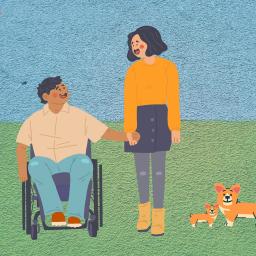Starting a family can and should be one of life’s most meaningful experiences. A time often regarded as being “blissful” is also known for being extremely stressful for new parents. For women with disabilities (WWD), preexisting disadvantages can intensify the stress that comes with having a new baby. These systemic barriers that WWD face can be overwhelming, emphasizing the need for support networks and assistance from others.
Prenatal care is expensive, and WWD often encounter costs that their peers without disabilities do not; specialized testing, additional fees for accessible services, or more medical oversight. Further, in the U.S. women with disabilities experience poverty at nearly twice the rate as their peers without disabilities (Center for American Progress, 2020). Discrimination in healthcare, limited employment opportunities, and economic disadvantage can limit access to services that all people deserve.
As the saying goes, it takes a village to raise a child. The availability of support networks, resources, and government assistant programs are vital to raising a child with all of the opportunities they should have. Personal assistance services (PAS), both informal and formal, are a crucial support for people with disabilities when performing daily tasks. For those with children, parenting tasks can fall under that umbrella.
There are also peer support networks, providing support and advice for other people who may have faced similar challenges. Parenthood should not be isolating, and connecting with others with common experiences can be a source of emotional support, a place to get guidance, and overall be an empowering experience. Limited information is available on parenting with a disability, but an expectant WWD noted, “Perhaps what I have found the most helpful during my pregnancy has been the advice and input from other women with disabilities who have ‘been there, done that.’ … Speaking with mothers with disabilities has helped me gain perspective on the experience of pregnancy. Even though physically our experiences are different, other women with disabilities have faced the same societal and attitudinal barriers that I am currently dealing with” (National Council on Disability, 2012).
Beyond building a community of individuals with shared experiences, the government also offers assistance programs to financially help parents with disabilities. Healthcare, nutrition, and living expenses can be provided through programs like SSI, WIC, and Medicaid. For example, the Special Supplemental Nutrition Program for Women, Infants, and Children (WIC) offers checks, cards, or vouchers for purchasing specific nutritious
foods to support healthier diets. Other assistance programs can help with the costs of healthcare, childcare, and other expenses. For further information on what benefits one might qualify for, you can click here (https://www.usa.gov/benefit-finder/disability).
The Pregnancy Discrimination Act (PDA) and the Americans with Disabilities Act (ADA) both serve as legal protections and provide a framework for ensuring equal rights. The PDA requires employers to treat pregnancy like any other temporary medical condition. The ADA prohibits discrimination against individuals with disabilities. It’s important for WWD to know their rights, and advocacy helps to raise awareness so that these
laws are upheld. The Protection and Advocacy System (P&A) agencies are “federally mandated to provide legal representation and advocacy on behalf of people with disabilities” (National Council on Disability, 2012).
Pregnancy and parenthood should be times of joy, not added hardship. Although there is a lot of discrimination, there is help out there. Peer networks, government programs, and legal protections can help WWD find community, resources, and advocacy to allow them to thrive as parents.
Resources:
1. https://www.americanprogress.org/article/basic-facts-women-poverty/?utm_source=chatgpt.com
2. https://americanpregnancy.org/options-for-unplanned-pregnancy/financial-help-for-pregnant-women/
3. https://americanpregnancy.org/healthy-pregnancy/planning/pregnancy-discrimination/
4. https://acl.gov/programs/aging-and-disability-networks/state-protection-advocacy-systems
Special thanks to Director Connie Lam, NYU Langone Orthopedic Hospital
Initiative for Women with Disabilities Elly and Steve Hammerman Health & Wellness Center
Becker, H., Andrews, E., Walker, L. O., & Phillips, C. S. (2021). Health and well-being among women with physical disabilities after childbirth: An exploratory study. Women's Health Issues, 31(2), 140-147. https://doi.org/10.1016/j.whi.2020.10.007
Byrnes, L., & Hickey, M. (2016). Perinatal care for women with disabilities: Clinical Considerations. The Journal for Nurse Practitioners. https://www.npjournal.org/article/S1555-4155(16)30300-2/pdf
Angelo A, Ceccanti M, Fiore M, Petrella C, Greco A, Porrari R, Gencarelli S, Ralli M, Vitali M, Ferraguti G, Galeoto G, Valente D, Framarino Dei Malatesta M, Messina MP. Pregnancy in women with physical and intellectual disability: psychiatric implications. Riv Psichiatr. 2020 Nov-Dec;55(6):331-336. doi:10.1708/3503.34890. PMID: 33349725.
National Council on Disability. (2019). Quality-Adjusted Life Years and the Devaluation of Life with Disability: Part of the Bioethics and Disability Series. Washington, DC: National Council on Disability. Retrieved from http://www.ncd.gov
National Council on Disability. (2012). Rocking the Cradle: Ensuring the Rights of Parents with Disabilities and Their Children. Washington, DC: National Council on Disability. Retrieved from http://www.ncd.gov
Powell, R. M., Mitra, M., Smeltzer, S. C., Long-Bellil, L. M., Smith, L. D., Rosenthal, E., & Iezzoni, L. I. (2019). Adaptive parenting strategies used by mothers with physical disabilities caring for infants and toddlers.
Health & Social Care in the Community, 27(4), 889-898. https://doi.org/10.1111/hsc.12706 Signore, C. (2022). Pregnancy in women with disabilities: Past, present and future. Paediatric and Perinatal
Epidemiology, 36(6), 769-770. https://doi.org/10.1111/ppe.12897 https://www.access-board.gov/mde/
New York Times: These Doctors Admit They Don’t Want Patients with Disabilities https://www.nytimes.com/2022/10/19/health/doctors-patients-disabilities.html
The Doctor Won’t See You Now: Why Do Barriers to Healthcare for Women with Disabilities Persists? https://womensenews.org/2024/06/the-doctor-wont-see-you-now-part-two-why-do-barriers-to-healthcare-for- women-with-disabilities-persist/



